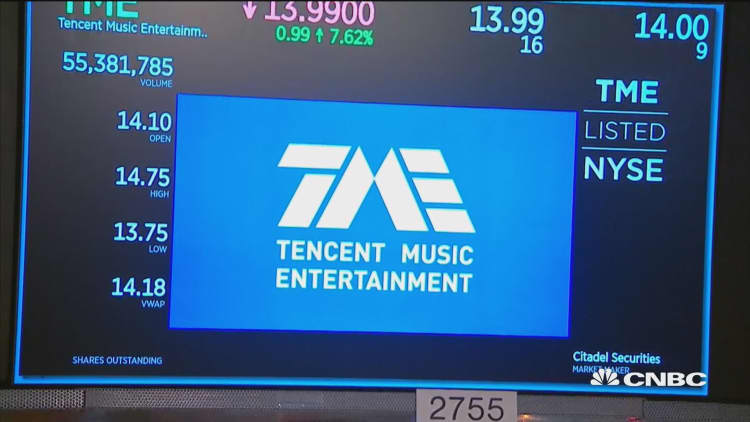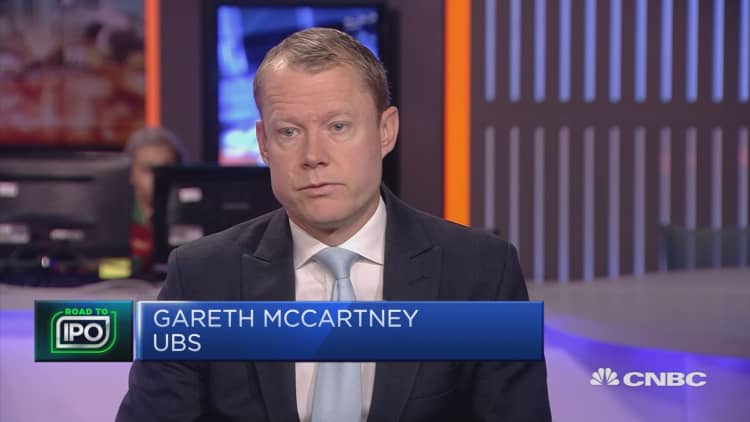Two recent deals in the initial public offering market show the problem that Uber, Lyft and other multibillion-dollar private Silicon Valley companies, such as Airbnb, Palantir Technologies and Slack, will face if they proceed with IPOs in 2019: finding a deal price that investors will support rather than pummel right from the first day of trading.
With all three major U.S. stock indexes ending last week in correction, and more economists forecasting a recession by 2020, these IPO candidates — some already filed and some just rumored — are racing against both a softening stock market and a recession clock for deals that in all could reach more than $200 billion in valuation.
Moderna Therapeutics went public in the largest biotech offering ever earlier this month, raising more than $600 million. It didn't price at the high end but rather the mid-end of its range, and shares of Moderna have been destroyed since, down roughly 20 percent since it opened.

Tencent Music gave the market a minor surprise by getting its deal done this week among the volatile market conditions and economic weakening in China, its home base. To succeed, Tencent had to price at the low end of its range, $13, a concession that has led to shares holding close to the $13 level in their first few days of trading. No pop that is customary for post-IPO first trades (18.7 percent for IPO first-day trades on average from 1980 to 2017), but no tanking.
Uber, Lyft, Palantir and Slack — all which have spent multiple years on the CNBC Disruptor 50 list — are considering IPOs that, according to recent reports, could reach a combined valuation over $200 billion, with Uber getting most of it: Uber ($120 billion), Lyft ($15 billion to $20 billion), Palantir ($41 billion), Airbnb ($31 billion) Slack ($7 billion).
Yet the companies need to weigh what investors will bear in terms of pricing. Some reports have insinuated that Uber and Lyft may be rushing to get deals done — both recently filed confidentially for IPOs. But the truth may be that their time to go public has simply come and they were never going to get to choose the perfect market conditions.
"I don't like the narrative that 'they know it is the top,'" said Kathleen Smith, principal at Renaissance Capital, which provides IPO research and manages IPO ETFs. "It takes time for these companies to go through the process. It is hard going public, and it very well may be that they were working on IPOs all year."
Smith said 2017 or the first half of 2018 might have been a better time to get an IPO done, but venture investors want an exit, and pricing pressure on deals is the price these highly valued start-ups may have to pay.
"Venture investors want an exit after a decade," Smith said. Uber launched in 2010. "There is a market for every company that wants to go public, and for the very large ones there is a bigger market, but there may be price pressure," Smith said. "We are seeing that in deals getting done now. Look at Moderna."

"It is entirely conceivable that all these companies — Uber, Lyft, Palantir, Slack and Airbnb — go public. Private investors want a liquidity event," said Jay Ritter, a finance professor at the University of Florida and IPO expert. "It is the lifecycle of these companies, not the market today. These are mature unicorns," he said, using the term that has become synonymous with a start-up valued at over $1 billion.
An Airbnb spokesman referred to comments made in the past by co-founder and CEO Brian Chesky that the company will be ready to IPO in 2019, but that does not mean it will.
Uber, Palantir and Slack declined to comment. Lyft did not respond to a request for comment.
Economic downturns take their toll on the IPO market
The IPO market is a derivative trade on the broader market, so if the Fed continues to raise rates — which is being questioned more with each passing day of market volatility — and if the yield curve between the two-year Treasury bond and 10-year Treasury bond inverts (an early recession signal), the IPO market will head down, and significantly, Smith said.
But two things that are certain as this batch of unicorns nears public offerings indicate that their deals won't be deterred: They will receive higher valuations if the stock market rises between now and their IPO dates, but even if the market doesn't cooperate, they will find buyers.
In August 2004 search engine company Google went public, even though the stock market had been falling in the weeks before its IPO. In March 2008 credit card processor company Visa went public, also following a period when stock prices had been declining.
"As we know, the stock market collapsed during the following 12 months, but Visa substantially outperformed the market because its fundamental business was very strong," Ritter said. Visa jumped from an offer price of $44 to a close of $56.50 on this first day of trading and then declined (total return) by only 6.2 percent during the following 12 months."
Ritter added: "There will be a reduction in deal flow if the economy turns, but successful tech start-ups will be selling out in IPO sales whether the stock market is up or down."
Uber and Lyft, in particular, should not have a problem finding investors. Ritter said with a market capitalization for U.S. equities around $30 trillion and companies paying dividends and repurchasing shares at the rate of $1 trillion per year, "the market can easily absorb $20 billion in ridesharing companies."
The IPO market is slowing already
Recent activity shows that deals are pricing at a point where the investor is nervous, but Smith said that is not necessarily a bad thing. It indicates there will be a trade-off that investors need to consider between taking risk in a market that could be going down and getting more attractive pricing on deals for companies that have strong long-term prospects. "It could be good time to go, even if it is painful," Smith said. "Investors always like to invest when it is a buyers market."
This year had been a strong one for IPOs, with nearly 200 deals, until September when the market began tanking. To put that in perspective, there has been only one year since the end of the dot-com boom in 2000 that has reached the 200 deal mark, 206 deals in 2014.
"The fact that the market is shaky right now, if it stays that way, we will see discounts to get deals done. It is amazing Tencent pulled off its IPO," Smith said, but she noted it was a large deal, a billion-dollar IPO that had to be priced at the bottom of its range. "And maybe it should have priced below its range, based on how it is trading," she said.
Several high-profile tech IPOs from earlier in 2018 also are trading poorly as public companies. On Tuesday, shares of meal kit delivery company Blue Apron, which went public in June 2017 at $10, went below $1 for the first time.
For Ritter the most striking stat — the one he has devoted much of his academic research over the years to exploring — is the diminishing of the IPO market over decades, as companies with $100 million or less in revenue can no longer do what was common in the 1980s and 1990s" go public, and more private buyers take out start-ups well above that size as well.
Qualtrics, which was on pace for close to $400 million in annual revenue, recently scrapped its IPO when SAP offered it $8 billion to be acquired, as much as $3 billion more than the IPO range set by bankers.
Between 2009 and 2017, there were two years during which 150 or more deals occurred (Ritter does not include in his IPO data ADRs, closed-end funds, REITs, natural resource limited partnerships or company offerings not listed by NYSE, Nasdaq or BATS). From 1980 to 2000, there were 16 years in which there were at least 150 IPOs.
"Large, visible companies such as Lyft and Uber will be valued by the market based on their business prospects," Ritter said. "Lyft and Uber are undoubtedly somewhat subject to business cycles, but the more important issue with them is the long-term growth."
IPO ETF versus S&P 500
| ETF | 1-month return | 3-month return | YTD return | 1-year return | 3-year return |
|---|---|---|---|---|---|
| IPO ETF | (-3.3) | (-17.3%) | (-10.5) | (-9.6%) | 7.70% |
| S&P 500 | (-2.6%) | (-7.8%) | 1.00% | 1.50% | 11.90% |
Source: Morningstar, data as of 12/12/2018
Renaissance data shows that this year there has been over $45 billion raised in IPOs, ahead of 2017's $35.5 billion — a 33 percent year-over-year increase in dollars raised and a 21 percent increase in number of deals. But the fourth-quarter numbers "have really dropped off," Smith said.
November, typically a big month for deals, had six IPOs. The $200 million raised in November deals "is nothing," Smith said. "We haven't had such a low amount in over 10 years in a November."
In December there have been four deals so far, the weakest December since 2015.
Even with desirable companies — especially ones in markets that have the potential to become monopolies or duopolies like ridesharing — Smith said all it takes is one bad deal to set the IPO market back. "Look at what happened with Facebook. It came out and proceeded to drop. The market had been weak that month prior to the Facebook IPO, and it was such a bad deal, the IPO market closed for four weeks after, no deals done. We don't want that again."
Trying to get to a reasonable valuation for Uber
One reason it might be better for IPO candidates — at least all those except for Uber — and for investors to have Lyft go first relates to how difficult it will be to value these companies.
Asad Hussain, emerging technology analyst at PitchBook, said companies like Uber have reached a critical point of inflection where they need to go to market now, and a choppy economic environment doesn't affect that decision as public markets represent the best way for them to achieve liquidity. "The impact to the stock price doesn't matter as much for Uber — what matters is that they are able to actually get to an IPO and the amount they're able to raise," Hussain said.
But getting to a reasonable valuation for Uber, whose reported $120 billion IPO valuation would be almost twice its last private valuation, is not easy since it is not as much of a pureplay rideshare company as Lyft.
The company's last quarter showed mixed results with slowing bookings from their core ridesharing growth and mounting losses as they invest more heavily into food delivery, micro-mobility, and other auxiliary MaaS (Mobility as a service) offerings. A successful IPO will be predicated on Uber's ability to show a clear path to profitability, Hussain said.
"With these investments, Uber is pivoting away from a pure-play ridesharing provider towards a bundled one-stop shop for urban transportation — the embodiment of MaaS. In the long term Uber's MaaS strategy could be positive in gaining users and growth; however, in the near term, hinging the company's future growth on various untested markets could negatively impact margins, as well as create uncertainty and additional risk for investors.
This could impact Uber's valuation when it goes to market," the PitchBook analyst said. "We believe Uber's strategy of shifting away from a pure-play ridesharing provider toward delivery, freight brokerage, and micro-mobility, makes the company more difficult to value."
Uber gross bookings growth decelerated sharply in the quarter to 34 percent year over year (YoY) from 41 percent in 2Q, likely due to competition from Lyft as well as difficulties in attracting new drivers. In response, Uber is investing heavily in its fast-growing units like the UberEats business. Uber just announced a deal with Starbucks for its delivery business.
In the near term, hinging the company's future growth on various untested markets could negatively impact margins, as well as create uncertainty and additional risk for investors. This could impact Uber's valuation when it goes to market.Asad Hussainemerging technology analyst at PitchBook
Hussain said the mixed results this quarter could cast a cloud over a 2019 IPO, but a lot will ride on the company's results next quarter showing strong growth and movement toward profitability. However, PitchBook thinks both Uber and Lyft have shown gross margin improvement indicative of an end to the long-standing price war between the two companies, and that is a positive for both and an important step toward sustainable economic profits for the industry.
While PitchBook, now owned by Morningstar, has its reservations, the potential Uber valuation is big for a reason — the size of the market it can obtain. In initiating coverage of Uber for Morningstar, PitchBook forecasts that Uber will gather nearly 50 percent of the ridesharing market by 2022 (up from 29 percent in 2017). Uber's total addressable market — which includes the aggregate of the global taxi, rideshare and food-delivery industries, along with the U.S. markets for freight brokerage and the share we believe rideshare companies can take from global public transport and U.S. bikeshare — is estimated by PitchBook at $630 billion by 2022, representing a 26 percent five-year compound annual growth rate.
The PitchBook analysis leads to a market capitalization of $110 billion for Uber and is predicated on the company improving its top line by 27 percent annually during the next 10 years and becoming profitable in 2022.
Renaissance Capital provides IPO investors with peer groups comprised of companies already trading publicly as a way to think about reasonable deal valuation. And trying to find a peer group for Uber shows how fraught that effort can be. Or, as Smith put it, "What do we even use?"
Renaissance currently includes an awkward peer pairing for Uber, which it has struggled to create: real estate data provider Zillow, because it is an internet-based transactions platform, and on-demand food service Grubhub. Over the past three months, Grubhub is down over 45 percent and Zillow down near-30 percent. Compare that to Airbnb, where a peer group of online travel bookings stocks is easy to create — Expedia, Booking Holdings; or Slack, which can be compared to a group of enterprise software or cybersecurity stocks, such as Atlassian, ServiceNow and Palo Alto Networks.
Even struggling to come up with any public market proxy for the rideshare giant — Renaissance may add publicly traded logistics stocks in the future — Smith does not doubt Uber's IPO will occur:
"There is a market for every company that wants to go public, and for the very large ones, there is a bigger market. It is just a function of price," she said.






